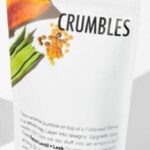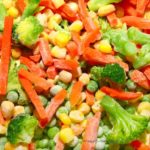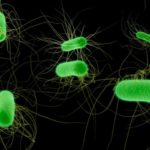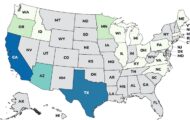Is ground meat safe to eat? With all of the recalls and outbreaks linked to those products, many consumers are asking that question. Consumer Reports conducted a study and found that, in many cases, those products are contaminated with dangerous pathogens including Salmonella and E. coli. The numbers are alarming. Almost a third of the ground chicken packages they tested were contaminated with Salmonella bacteria. And every single strain was resistant to at least one antibiotic, adding to the fear of the development of antibiotic-resistant bacteria. Consumer Reports also found a strain of Shiga toxin-producing E. coli in a sample of ground beef that was so dangerous they alerted the Department of Agriculture, triggering a recall of more than 28,000 pounds of ground beef. Ground … [Read more...]
What is Causing Daily Harvest French Lentils Crumbles Illnesses?
In the last few weeks, there have been almost 500 reports of adverse reactions from consumers who ate this product. Some people have required hospitalization, and at least one person underwent gallbladder surgery after showing signs of liver damage. In fact, a number of people reported that tests showed their liver enzymes were very elevated, and in most cases people said their symptom onset was quite sudden. The common stories being told by people who got sick after eating these lentil crumbles from Daily Harvest have led to a number of theories on what might be causing these symptoms. For its part, Daily Harvest put out a statement yesterday that reads, "We have spent the past ten days working with the FDA, state agencies and multiple independent labs, as well as experts in … [Read more...]
Built Bars Banana Cream Pie Puffs Protein Bar Recalled For E. coli
Built Bars Banana Cream Pie Puffs Protein Bars are bing recalled for possible pathogenic E. coli contamination. The specific strain of E. coli has not yet ben determined. No illnesses have been reported to date in connection with the consumption of this product. Thee recalling firm is Built Brands, LLC of American Fork, Utah. The recalled product is Built Bars Banana Cream Pie Puffs Protein Bars that are packaged with lot number D22151011 that is printed on the outside of the wrapper. IT was distributed nationwide to 1,049 potential customers through mail order. The customers would have received this product after June 6, 2022. The potential for contamination was noted after routine testing that was conducted by an accredited third-party laboratory at the request of Built Brands … [Read more...]
States With More Public Health Funding Track More Foodborne Outbreaks
States with more public health funding track more foodborne illness outbreaks, according to a study published in Emerging Infectious Diseases. The study was conducted by scientists at the Colorado School of Public Health with assistance by the University of Minnesota, the CDC, the FDA, and the US Department of Agriculture Food Safety Inspection Service (FSIS). Foodborne illness surveillance in states is critical to identifying multistate outbreaks. Unfortunately, not all outbreaks are detected and investigated. This study looked at 8,131 single-state outbreaks reported during the years 2009 to 2018. Multistate outbreaks were not included in this analysis. Overall, high-reporting states reported four times more outbreaks than low reporting states. And low reporting states are less … [Read more...]
Senator Murray Wants Answers on Alleged Food Safety Failures
Senator Patty Murray (D-WA) wants answers on alleged FDA food safety failures after a report in Politico listed problems with that agency. Senator Murray is Chair of the Senate Health, Education, Labor, and Pensions Committee. A letter was sent to FDA Commissioner Robert M Califf, asking for answers and immediate action. The Politico report was based on more than 50 interviews with experts and former officials and found that the FDA is more focused on regulating and overseeing drugs and other medical products than food. For instance, FDA commissioners rarely have experience with food issues, but are usually medical doctors. The report lists deadly food poisoning outbreaks and the recalls associated with the contaminated foods, starkly outlining how long it can take to issue a recall … [Read more...]
Toboton Creek Raw Whole Milk Recalled For Possible E. coli
Toboton Creek raw whole milk is being voluntarily recalled in Washington state for possible E. coli contamination. No illnesses have been reported to date in connection with the consumption of this unpasteurized milk product. The dairy is located in Yelm, Washington. The recalled product is Toboton Creek raw whole milk with best by dates of "2/1" through "2/9" (February 1, 2022 through February 9, 2022). The milk was bottled in half gallon containers and was sold through retail stores in Yelm and Olympia, Washington and was also sold directly to consumers at the Toboton Creek Dairy farm. The recall was triggered after routine sampling conducted by the Washington State Department of Agriculture (WSDA) found the presence of toxin-producing E. coli bacteria in the dairy's retail raw … [Read more...]
Study Shows E. coli Toxin Accelerated Colon Cancer in Study Mice
A new study shows that an E. coli toxin accelerated colon cancer in study mice, raising the possibility that about two million new cases of colorectal cancer diagnosed every year around the world could originate from food poisoning, even if the cases are brief and mild. The study was conducted at Johns Hopkins University/Bloomberg School of Public Health and published in the January 12, 2022 issue of the journal Cancer Discovery. Certain E. coli bacteria produce a toxin that can damage DNA in intestinal cells. The novel genotoxin is called UshA. The mice studied are genetically susceptible to developing colon cancer, called ApcMinΔ716/+ types. UshA triggers DNA damage and initiates tumor transformation during infections both in vitro and in vivo. This type of infection could … [Read more...]














